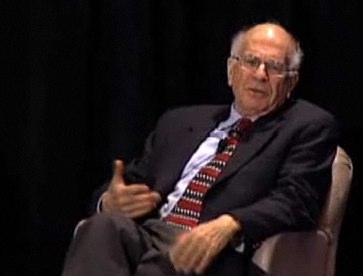Oct 22
Daniel Kahnemann - Organisations are Decision Machines
Economists are an under-utilised source of theory for knowledge management. They realised a long time ago that the collective (as distinct from an aggregate of individuals) can be a salient unit of analysis, and have used that insight to learn about the information processing activities of social groups. In this video interview from the McKinsey Quarterly last year, Daniel Kahneman describes organisations as “machines for producing decisions” and then suggests some practical interventions to help maintain quality control in decisions (including Gary Klein’s pre-mortem technique). A lovely example of bridging theory with grounded practice.

Oct 22
Michael Sampson in Singapore
Good friend Maish Nichani is hosting a Masterclass in Singapore with Sharepoint guru and author Michael Sampson, on “Sharepoint Collaboration and Governance”. I know Michael from the conference circuit, and I have his books – I have a lot of respect for the solid good sense he brings to the Sharepoint phenomenon. The trick with doing good work in KM around Sharepoint is to figure out what it’s good at, and where its limitations are, and then to put some clever design around how you deploy it. This means some technical knowledge, but it mostly means process and governance smarts. If you think a systems integrator can deploy Sharepoint for you and KM will then somehow suddenly happen, you’re deluding yourself (another example of magical thinking). And a KM team often doesn’t know enough about Sharepoint (and its supplier ecosystem) to know how to commission and deploy it for effective results. This gap is exactly the niche that Michael Sampson has very competently filled, and where he’s made a global name for himself. This Masterclass, on November 5th, is actually a steal – at half the price of Michael’s normal fees in Australia and New Zealand, and with Michael’s two books thrown in for free, if you’re working with Sharepoint you can’t afford not to attend this event.
Oct 21
Knowledge Communities and Magical Thinking
From Yigal Chamish, a great, grounded story of a community of practice in full swing. The photos make all the difference. The post was in response to a story by Matt Simpson about “a manager who thought he could create a community” by setting up a collaboration space, nominating members and selecting a community manager (which alerted me to Matt’s great blog and podcast series).
Matt’s example is what I called in Canberra last week, the all-too ubiquitous use of “magical thinking” in KM, the belief you can create desired effects by deploying ritual activities and incantations, combined with an intense lack of curiosity about the causal relationships between your actions and the supposed results. I’ve been reading Eva Gillies abridgement of Evans-Pritchard on Witchcraft, Oracles and Magic Among the Azande, and the parallels in thought styles leap out at me. It is this lack of curiosity that is the danger, and while I’m a staunch believer in the value of complexity theory for sensemaking in social interventions such as KM, there is a risk that the “complexity” mantra provides yet another layer of “magical thinking” to keep our enquiring intellects at bay.
Oct 20
Dr Vaine on Fourth Generation Knowledge Management
Yes, I’ve been a Bad Blogger… a combination of hectic client schedule, KM conference season in full swing, and trying to get my head into shape to write the opening chapters of my new book. But I couldn’t resist this video clip of Dr David Vaine speaking at the ACTKM Conference in Canberra last week. It was a great conference, the best yet. I missed Dr Vaine (I can’t stand the man, truth be told), so thanks to Mark Schenk for capturing this on his iPhone 3GS. The sound is better if you listen with earphones! You can download the mp4 video file here.
Download the MP4 video file by right clicking here
Go to the show page on vimeo by clicking here
Oct 06
Calling All Records Managers in Singapore
If you’re dealing with records, and would like a platform to meet your peers from other organisations to exchange knowledge and experience in this area, do send me an email. A few of us are planning to get together in November.
Aug 27
In Defence of a Chief Knowledge Officer
Lately I’m increasingly convinced that without a Chief Knowledge Officer, KM is not likely to go very far in organisations. The KM function tends to be placed at mid level, obscured within a broader corporate function like Organisation Development. Seldom does it report directly to a senior manager. Even when it does, the senior manager is probably looking after several other functions, and is seldom a KM professional, ie without a good understanding of what KM is and what it really entails. There are many drawbacks to this situation.
Firstly, many things that a KM team does must involve the senior management. One of those things is cultivating a knowledge sharing culture. You cannot change an organisation’s culture without getting the most senior people to set examples. But getting senior people to do this requires the power to influence and personal power of persuasion. You can’t do this sandwiched somewhere within a hierarchy. You need to be pretty darn close to the top of it.
Secondly, all organisational change like reorg and downsizing have a direct impact on an organisation’s knowledge resources. The KM function must be placed so as to be able to preempt those changes and respond accordingly, rather than be one of the last to know. Too often we hear about organisations that try to retain knowledge only when it’s too late. To avoid that you need someone to be sitting where he or she will be the first to know of imminent changes, and then act accordingly.
Thirdly, even in a steady state, an organisation should constantly be keeping an eye on the management of knowledge resources at a strategic level. Where do we get our competitive intelligence from? Do we have the knowledge resources to carry through our business strategies? If not, what are we doing about it? If yours is a knowledge-driven business, you can’t afford to leave those important questions to people who only get an occasional peek into the boardroom.
Fourthly, KM is never just about managing knowledge but also about managing human resource, information technology, etc. Most organisations position KM as just another one of those corporate functions, giving the team no power over the others. Time-wasting politicking arises as a result. A CKO with jurisdiction over those corporate functions will sidestep a lot of turf wars and silos.
Will a KM Steering Committee suffice, if the appointment of a CKO is not possible? It depends on how much time and energy the committee can give to KM. KM requires constant attention, while steering committee members usually already have full-time jobs. Should we assign one senior manager to be the CKO? Only if he or she commits to learning about the science and art of KM.
KM has been around long enough for many practitioners to learn what works and what doesn’t. My hope is that those practitioners will stay on in their organisation long enough to rise to the top, where they will acquire ascribed power to influence for real change. Alas, most knowledge managers have short-lived career, resulting in not many qualified CKOs around. In my next post, I’ll blog about what qualifications I think a CKO should have.
Aug 27
Survey on the Future of Taxonomy Work
I have been analysing the knowledge, skills and experience needs of the taxonomy profession, and as part of this I am conducting a survey on the present and future of taxonomy work and the needs of taxonomy professionals.
I’ll be reporting the results at Taxonomy Bootcamp in San Jose this coming November, and participants in the survey will also get a report of the results (which will include additional research beyond the survey).
For those of you who believe that taxonomies still have a future, this might make interesting reading, and for those of you who believe a la Theresa Regli that “taxonomies are dead”, we’d like to hear from you on why!
You can take the survey at http://tinyurl.com/taxonomywork
Many thanks in advance!
Aug 11
Discounted Passes for KM World and Taxonomy Bootcamp
KM World and Taxonomy Bootcamp (I’ll be speaking at both) are offering Green Chameleon readers a US$200 discount for each event (and you can also get a free pass to visit the exhibition when you register).
Here’s the KM World registration form with the discount built in: http://tinyurl.com/mfmn2h
Here’s the Taxonomy Bootcamp registration form with the discount built in: http://tinyurl.com/l4npdv
Aug 05
How Much Power Do You Have?
Here’s a recent aside from Edward Tufte that got me thinking:
“In an authoritarian institution, such as a corporation, there’s nothing like an order from on high saying, “From now on, we’re not using PowerPoint.” That will do it. People will work out something.”
So if you’re a CEO or somebody senior, what can you get away with?
- Could you successfully ban Powerpoint?
- Could you do the rational thing and switch everybody off PCs and onto Macs (you wouldn’t need half as many collaboration tools and productivity would soar)?
- Could you switch off the corporate mailserver and let anyone use whatever email accounts they wanted to?
- Could you get your managers to think more and talk less?
The thing is, I’m not sure the power of leaders is all that it’s cracked up to be… or implied by Tufte’s statement. Power is generally given, not taken, and infrastructure both soft and hard (=baggage) is often much more powerful than leaders. Who, however feel they have to strut the stuff, so they become very good at making theatre out of decisions they are allowed to make.
In KM we talk a lot about the importance of senior management buy-in and support. But it only goes so far. Figuring out the leverage and affordances in the infrastructure and then massaging and coaxing it patiently through change is much harder but ultimately more useful. The problem is, we haven’t yet figured out to make theatre out of it. And that makes us boring.
Aug 04
The Bird Island Game
I like learning games, and I especially like the Bird Island game invented by the guys at Knoco (thanks Kaye for the link), and written up in the April edition of Inside Knowledge magazine.
The game has you trying to build a tower out of stationery supplies (as tall as possible). Then you try out an after action review and then a peer assist with other groups (which normally help you build taller and better). Finally you can access the best practices “knowledgebase” which has been built up by the Knoco guys over a decade of running the game with different groups. There’s a very explicit link to using KM techniques to improve performance.
I like the way Nick and Tom also thought about the danger that over-reliance on best practice might inhibit innovation, and that they seem to have re-ignited the innovation by introducing constraints (eg with the materials).
Of course, as a learning game, this only gives one (very clean) strand of the KM picture, it completely misses the whole area of organisational politics, culture, competing objectives and priorities, and less easily measurable outputs that KM usually has to deal with, but it is a very nice model for communicating the value of specific KM techniques.
And I like people who share. Kudos to Knoco!

